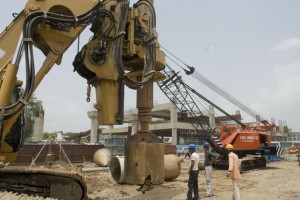This will do immense good for agri sector!
Agriculture and industrial development is closely linked!
 The current good news about industrial pickup is good for agriculture! Key sectors, eight sectors, coal, crude oil, natural gas, refinery products, steel, cement, electricity rose sharply to eight percent from 3.7 percent, in the first eight months.
The current good news about industrial pickup is good for agriculture! Key sectors, eight sectors, coal, crude oil, natural gas, refinery products, steel, cement, electricity rose sharply to eight percent from 3.7 percent, in the first eight months.
Agriculture thereby will get a real boost.
Why even such sectors like national highways, railways, metro rail in cities, civil aviation, ports and shipping would accelerate developments in the key sectors like agriculture.
There is not yet any great awareness and even appreciation of this basic fact.
Agriculture in Independence was a poor sector. Poverty-ridden sector. India was accustomed to period famine and large scale perishment of people.
British Indian history is what?
Anybody asked?
Even Gandhi and Nehru didn’t ask the relevant questions, right?
See what it was like in the 19th and, why even in the early 20th century.
Why, we Indians didn’t even know, let alone ask some hard questions.
There was this slave trade in the Negroes from Africa to West Indies islands, colonised by the British, French and Spanish and it was a shameful period in colonial history.
Why even in India, in the Dutch colonies, like Tranquebar in Tamil Nadu and Pulicat from where ships were loaded with slaves bought or captured or kidnapped who were sent to Indonesia. From the West, it was a big, organised crime against humanity that was perpetuated by the British. A book before us, a study of the Atlantic Slave Trade, 1441-1807(by James Pope Hennessy) details in great length how the West Indies sugar plantations, tobacco and coffee cultivation were carried out by this slave labour.
Some British cities like Bristol and Liverpool, why even London, were called slave ports. The huge and imposing country houses we see even now in the British country side were all built by the earnings of this shameful slave trading!
So, what wonder that India was another hugely exploited land?
So, whenever we are reminded of the so-called green revolution we are not delighted as we see today. Looking back we have to forget that shameful past too.
Our great leaders of the past, even of the present must have known that India’s agriculture is India’s great wealth.
India’s land wealth, water resources and other geographical location are all our strategic advantages.
Let us know at least change our mindset. Let the arm-chair experts and intellectuals and other experts, those who thrived on government subsidy, even now, become a bit more modest when they extol the virtues of the green revolution, the need for environment, bio diversity and natural farming etc.
Also, by extolling the virtues of a small-man based agriculture, the opposition to industrialisation, the exploitation of the various mineral resources we have to make room for a more balanced, reasonable, liberal use of reason and restraint. There is no room for extremist stands or views in agricultural development.
In agriculture are the vast mass of people engaged. So there is scope for exploitation by the various vested interests.Corporates are not alone for blame.
We have to blame the bureaucracy-driven short-sighted polices.
There are so many policies; there are so many institutions, agencies created years ago. They are kept alive on the budgets of the agencies like ICAR, Planning Commission and various other departmental heads like even the rural development ministry.
We need a very pragmatic as well as well thought out principled use of discoveries of sciences and technologies. There is a prejudicial view that foreign and Indian agribusiness companies have to come to exploit our agriculture and poor farmers. This is wrong totally.
We don’t want to take on names. But can the so-called experts, even the veterans of policy making to explain to people about whether we need a biotechnology in agriculture or not. They are all hesitating to explain. The use of science has to be explained.
Now, almost the entire cotton belt is covered with Bt cotton seed. In some states like TN it is 82, K’taka, 74, AP 99, MH 96, Punjab 94, Haryana 92. Now there are other biotech applications to various other crops, crop improvements, seed developments.
There is much prejudice. This prejudice has to be educatively removed. We need new technologies. The deployment of IT tools can do wonders in spreading information, accessing information, marketing, price monitoring, why even in global tracking of trade information etc.
The government in New Delhi, to put in bluntly is IT-illiterate!
Also, men like Mr.Nandan Nilekani must be more pro-active. Of course, his Aadhar project is in a critical stage. But he must explain to the people. Men like Sam Pitroda is also silent.
These are no good signs. Mr.Rahul Gandhi must do more homework.
He must interact with industry leaders. He must draw up plans for agriculture and rural development. Slums is much talked about. How can we avoid slums when the cities are rapidly urbanising and growing?
So, we have to have a very objective, on the ground outlook.
Indian agriculture is a modern agriculture. It gets pushed by developments in other sectors. It gets pulled by developments in other sectors.
Let the policy makers realise there is a dynamic need to keep ourselves updated with what is happing in agriculture, from inside as well as from outside!
One more point. Let us welcome outsiders expertise. But outsiders, if they are from former colonial countries, we Indians have to be a bit wearisome!
Why? Their views and opinions don’t come without some bias or other.
This subject itself needs wider elaboration. We would do so in future writings.